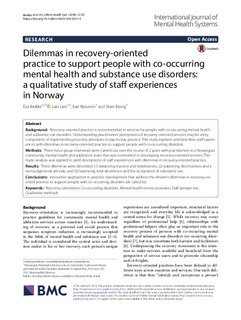Dilemmas in recovery-oriented practice to support people with co-occurring mental health and substance use disorders: A qualitative study of staff experiences in Norway
Peer reviewed, Journal article
Published version
Permanent lenke
http://hdl.handle.net/11250/2589014Utgivelsesdato
2018Metadata
Vis full innførselSamlinger
Originalversjon
International Journal of Mental Health Systems. 2018, 12 (30), . 10.1186/s13033-018-0211-5Sammendrag
Background Recovery-oriented practice is recommended in services for people with co-occurring mental health and substance use disorders. Understanding practitioners’ perceptions of recovery-oriented services may be a key component of implementing recovery principles in day-to-day practice. This study explores and describes staff experiences with dilemmas in recovery-oriented practice to support people with co-occurring disorders. Methods Three focus group interviews were carried out over the course of 2 years with practitioners in a Norwegian community mental health and addictions team that was committed to developing recovery-oriented services. Thematic analysis was applied to yield descriptions of staff experiences with dilemmas in recovery-oriented practice. Results Three dilemmas were described: (1) balancing mastery and helplessness, (2) balancing directiveness and a non-judgmental attitude, and (3) balancing total abstinence and the acceptance of substance use. Conclusions Innovative approaches to practice development that address the inherent dilemmas in recovery-oriented practice to support people with co-occurring disorders are called for Dilemmas in recovery-oriented practice to support people with co-occurring mental health and substance use disorders: A qualitative study of staff experiences in Norway
